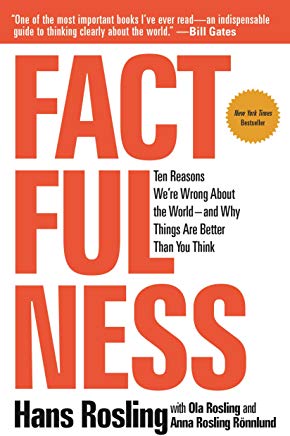

This article is an excerpt from the Shortform summary of "Factfulness" by Hans Rosling. Shortform has the world's best summaries of books you should be reading.
Like this article? Sign up for a free trial here .
What is Attribution Bias? Why do you tend to attribute actions to people’s fundamental traits, instead of the circumstances or external factors?
Learn more about what attribution bias is, find examples, and learn how to overcome it.
Why Does Attribution Bias Make Us Blame?
The Attribution Error or Blame Instinct is a close cousin of the Single Perspective Instinct. It is the desire to find a single person or entity to blame for something bad. Too often, however, we end up scapegoating rather than analyzing the deeper structural roots of the world’s problems.
Pharmaceutical companies are often blamed for underinvesting in diseases like malaria and diarrhea that pose a high risk to people at Level 1. In fact, these investment decisions are guided by shareholders (who are made up of the general public and large institutional investors like retirement and pension funds).
The Attribution Bias is also at work in the popularity of conspiracy theories. All conspiracy theories overstate the importance or influence of nefarious people and organizations. This provides an easy source of blame for complex events and trends that are really the result of larger social, economic, and political forces.
Blaming: Attribution Bias
It is tempting to look to high-profile targets to blame for the world’s problems. Businesses, journalists, refugees, and political leaders are some of the most popular punching bags. But they don’t actually contribute to problems as much as you might think.
Attribution Bias: Business
Businesses are profit-maximizing entities. Because of this, people often assume that bad things in the world are solely the product of capitalism, greed, and businesses putting their profit margins over society’s broader health and welfare. However, businesses can actually use their profit motive to find more cost-effective and efficient ways to deliver essential services. As we saw with the Size Instinct, being cost-effective is being humane.
For example, an innovative pharmaceutical company called Rivopharm is able to supply UNICEF with cheap malaria tablets without cutting corners or compromising on quality. Instead, they use advanced technology and just-in-time delivery of raw materials to manufacture inexpensive and effective pills while still making a profit.
Attribution Bias: Journalists
Journalists are often accused of distorting the facts to promote an agenda. Politicians especially love to point the finger at journalists for unfair or inaccurate reporting. And the media really does contribute to a lot of misunderstanding about the world. But are they really to blame? No.
A recent IPSOS poll shows that journalists are just as misinformed as the rest of us, whether it’s about worldwide vaccination rates, future population growth, or female educational attainment. Of course this ignorance is going to be reflected in their coverage. The solution is to combat the ignorance and address the larger systemic factors that shape coverage—not wrongly accusing individual journalists of lying.
Attribution Bias: Refugee Smugglers
In 2015, over 4,000 refugees drowned in the Mediterranean Sea. The European media and general public were quick to blame the smugglers who packed the refugees into unsafe rubber dinghies. But it was actually the EU’s own regulations that forced people to travel this way. These regulations penalize airlines for boarding people without proper entry documents, and those documents are impossible to get in war-torn countries. Since the airlines won’t take them, the refugees have no choice but to use dangerous overseas smugglers.
Attribution Bias: Political Leaders
We attribute individual political leaders with having far more influence over events than they really do. There is a “blame and claim” dynamic. We blame them for bad things (like recessions) and credit them for good things (like economic expansions) that they actually have little control over.
Mao’s famous one-child policy in China is unfairly credited for bringing down the country’s birth rate. In fact, that trend had begun a decade before the policy took effect. Meanwhile, the Pope, the leader of the institution most opposed to contraception, seems to have little control over the behavior of his flock. The data shows that 60 percent of people in Catholic-majority countries use contraceptives.
Who Really Runs the World?
In fact, larger forces like institutions and technology are far more powerful and influential (for both good and bad).
Institutions and societies outlast individual leaders, and thus have far more power and influence.
The human progress that we’ve discussed is not the result of individual people getting smarter or kinder. It’s because we have built a system of local, national, and international institutions that improve our material standard of living and reduce conflicts.
Don’t look to the visionary ideologues or the powerful politicians: look to the civil servants, nurses, doctors, teachers, and engineers who work every day to improve our world.
Similarly, technology has been a driver of human progress throughout human history. It frees us from the drudgery of everyday hardships so that we can focus on more intellectually satisfying pursuits. Think about how something that we take for granted, like washing machines, transformed people’s lives. They freed people (especially women) from time-consuming domestic work and empowered them to use that time to get an education or start a career outside the home.
Causes of the Attribution Bias
Why are we so quick to blame and assume bad intentions on other people?
Simplicity
Blame frees us from having to look deeper at the more complex root causes of phenomena.
It also frees us from having to look at our behaviors and assumptions and why they might be causing harm.
Comfort
Blame implies that there is someone or something who is responsible, and that bad things are the result of a deliberate plan. This frees us from the alarming idea that the world is often chaotic and random. It is actually more comforting to believe in a nefarious force controlling the world from behind the scenes than it is to believe in a world that is often irrationally, unintentionally, and unpredictably cruel.
Problems Arising From the Attribution Bias
The Blame Instinct simplifies our view of the world and causes harm to vulnerable people.
Ignoring Structural Factors
As we’ve seen, larger structural forces and systems are the real movers and shakers of history, not individuals. When we narrowly assign blame (or credit) we blind ourselves to the complexity of the world. We focus on symptoms of problems (like the refugees in dangerous boats) rather than the complex factors that give rise to them (like civil wars and burdensome regulations).
Scapegoating
The Blame Instinct causes us to lash out at the wrong people. Major persecutions of minority groups and vulnerable people throughout history (and in the present day) have been driven by the Blame Instinct.
Overcoming Attribution Bias
How do we resist the urge to blame? By looking for alternative explanations and paying attention to the bigger picture. Big events are almost never caused by one thing. Embrace multifactorial explanations, examine the broader context and structural factors in play.
Outside of comic books and movies, superheroes don’t exist. Single individuals don’t control economies, win wars, or establish democracies. Those things are achieved by mass movements, institutions, and systems.
———End of Preview———

Like what you just read? Read the rest of the world's best summary of Hans Rosling's "Factfulness: Ten Reasons We're Wrong About the World" at Shortform . Learn the book's critical concepts in 20 minutes or less .
Here's what you'll find in our full Factfulness summary :
- Why we evolved to be negative, and why it's terrible for us today
- Surprising statistics about how people die - from plane crashes to swine flu
- How the world isn't nearly as poor as you think it is
- How to think smarter about the world, and the rest of life






